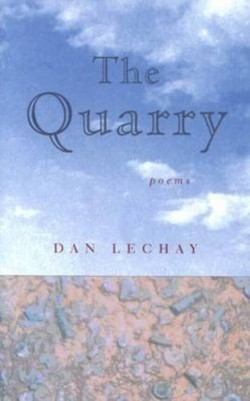The Quarry
Heraclitus believed that the conditions of man and nature are indisputably connected, that even opposing forces are linked in the grand scheme of things. This collection of poems, by the winner of the Hollis Summers Poetry Prize, begins with a quote from that ancient Greek philosopher, whose idea colors many lines in a compilation affixed to the American Midwest, which runs through the poems as backstory. The pieces are grounded in literary scholarship, but they’re accessible and can be appreciated on different levels because of the poet’s skill and his choice of subjects.
In the “limestone belly” of the Midwest, muses Lechay, “the black trees ascended.” Those lines initiate the poem, “In Limelight,” and carry the reader on a journey that includes not only the starkly beautiful physical environment, but also the “us” in a lyrical narrative that yields a confessional burst. The speaker queries the universe by asking in alliterative fashion: “Given limbs of lime, / of loam, / of lamias-how could we help it?” The confession slips in as quietly as the dark surroundings with “we dissolved into each other.”
The sound in this poem manifests incredibly when read aloud. There is deftness in Lechay’s technique as he balances words like “gastropod” and “brachiopod” with verbs like “gleamed” and nouns like “spilth” and “weft.” The reader can easily glide into this poem and view the surroundings as did the speaker in the poem. By the time the descriptives wend their way to “the giant slabs still standing,” and the finale of preparing for another “several billion brilliant days,” there is more than a whisper of the ancient philosopher’s beliefs in the permanence of the cosmos.
This book also reflects the capability of the poet to diversify. “Ghost Villanelle” makes an excellent offering within a largely free verse collection, and adheres to the requirements of rhyme and repeated lines in this nineteen-line form. Yet the poet delights with subtle changes in the syntax of the lines that repeat. The form itself is perfect for the dance of fear a ghost can inspire, whether it is a ghost that frightens a child, or a ghost that causes an adult to twinge.
Lechay, who has taught literature at the University of Iowa and published poems in many journals, brings an assortment of wares to the poetic table that is The Quarry, and the book expands, as good poetry will, with subsequent readings. Poetry lovers will find much to enjoy in a collection that embodies philosophy and place and encourages the reader to savor both, taking pleasure in the indisputable interconnectedness.
Reviewed by
Kay Day
Disclosure: This article is not an endorsement, but a review. The publisher of this book provided free copies of the book to have their book reviewed by a professional reviewer. No fee was paid by the publisher for this review. Foreword Reviews only recommends books that we love. Foreword Magazine, Inc. is disclosing this in accordance with the Federal Trade Commission’s 16 CFR, Part 255.

